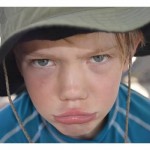“Mommy, why do the leaves fall from the top of the tree first?”
Ezra asked this question in the car last week, and before I could say anything in response, he and Zachary started spouting off theories about what could cause this phenomenon. Which is good, because I had nothing to say. I had never noticed that the leaves fell first from the top and was trying to decide if it was true. But sure enough, as we drove on I noticed that the tops of many of the spectacularly colored Fall trees were bare while the middles and bottoms had leaves. In fact, I realized that I had seen this pattern before but had never stopped to articulate the observation or ask a question about it.
This is one of the many ways I feel ripped off by my crappy education. I was never encouraged to observe and ask questions. During my first week in college, my chemistry professor said that he was now going to explain why the atom didn’t collapse on itself. I was stunned. How had this question never occurred to me before? I had known since I was very, very young that positives and negatives attract. And I had known since 8th grade that an atom had a positive nucleus with negative electrons orbiting around it. But I had never wondered why the atom didn’t collapse on itself. (It’s possible that I am just not all that bright, but I’d rather blame my uninspiring teachers.)
I really don’t want the same unquestioning, unthinking outcome for my kids. So I’m working hard to promote what Ellen Galinsky names as the fifth of seven critical life skills that all children need: Critical Thinking. She defines it as the search for valid and reliable knowledge to guide beliefs, decisions, and actions. And while she talks some about how this skill is needed in all types of decision making, she spends most of the chapter on scientific critical thinking.
She suggests that I do the following to help Zach and Ezra answer the falling leaves question:
- Notice when my children are developing theories. Check!
- Promote their curiosity about the theory. Don’t just answer their question. Check! This is, of course, easier to do when you don’t know the answer. Check again!
- Help them find other experts to learn from. Check, check, and triple check! I’m a big fan of experts. As it turns out, Ezra asked his question on the way to a nature study class that the boys take with four other homeschoolers and that is taught by Kate the nature nut who knows everything about bugs, and plants, and weather, and dirt.
- Help them evaluate information they gather. Check. Well not really. But I’m planning on doing this and I thought it would be nice to get a check on everything so I’m giving myself advance credit.
I don’t think that the term critical thinking was around when Charlotte Mason was writing in the late 19th and early 20th century. But since I am reading her book along with Galinsky’s, I thought I’d see what she has to say about thinking.
A lot actually. Thinking is one of eight moral habits of mind she writes about in Volume I of her education series. In case you’e wondering how thinking could be considered a moral habit, here’s her reply:
Aren’t there already enough people going through the world without any deliberate attempt at thinking or use of their wits?
Gotta love those feisty Victorian schoolmarms.
Mason suggests that every lesson have a why question in it, with parents and children alternating who asks the question. The child should then be made to come up with ways to answer the question, regardless of who asked it. Finally, when the child has come to the end of their ability to ascertain an answer or method for answering, parents may supply one of their own.
Between my own pathetic lack of question-producing curiosity and my acting belief that all knowledge can be found on Google in a matter of minutes, this life skill is going to be tough for us to work on together. Gratefully, Jeff, my homeschool partner-in-crime, is doing his dint six hours a week, and he has this skill down pat. He has vast amounts of curiosity and tons of background knowledge about just about everything, so he can ask and help the boys answer all kinds of great questions.
Which is partially why I married him. I may not know that much about the natural world, but I know a good man when I see one.
(PS – SixSeedsTV, a website for parents is posting this series of blog posts, where I compare Mason to Galinsky, on their website, sixseeds.tv. I love their byline: Bringing Stories Home & Service to Life. Cool, huh?.)











